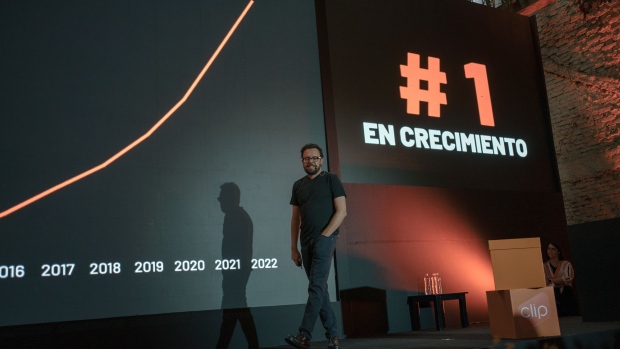May 27, 2022
Latin American Startups Are Facing a Wipeout, Says Clip CEO
, Bloomberg News

(Bloomberg) -- A crash in venture capital funding is set to wipe out startups across Latin America and delay potential initial public offerings for years, but the head of Mexican payments company Clip says his company is set to thrive.
Latin America was the world’s fastest-growing region for venture funding last year. But now it’s facing a “hangover” as investors recoil from risky bets and many companies are not going to survive, said Clip Chief Executive Officer Adolfo Babatz.
“Right now, an IPO is out of discussion, but if we list, it will definitely be in the US,” Babatz said in an interview this week from the company’s cozy tech-startup style headquarters high in one of Mexico City’s new towers. While Mexico’s more mature startups had been expected to possibly go public this year or next, the current “meltdown” will “delay everything for maybe 24 months,” he said.
Mexico’s other so-called unicorns that are valued more than $1 billion, such as used-car seller Kavak and cryptocurrency exchange Bitso, are also expected to choose US markets when they eventually list in what would be another blow for the local stock market, which has seen a spate of delistings and hasn’t had a major IPO since 2017.
Babatz said he has no need to raise funds from private investors or turn to public markets any time soon. Early last year, Clip received a $250 million investment from SoftBank Group Corp.’s Latin American fund and Viking Global Investors LP that took it to a $2 billion valuation.
Clip is focused on consolidating its position. At a presentation on Wednesday evening, Babatz held forth Silicon Valley-style, showing off the latest versions of the company’s point-of-sale terminals that start as low as $10 along with a new tablet on a stand that sells for $150.
“With the launch of this product, Clip is going to change the face of commerce in Mexico,” Babatz said as he strode across the stage in a black t-shirt.
Babatz declined to discuss specific data and there is little independent analysis available on closely-held startup companies like his.
Clip’s white and orange devices, which also help manage inventory, are becoming common across Mexico at corner shops and restaurants but there is still a huge market. Only about 900,000 merchants are served by traditional bank terminals out of 11 million formal and informal businesses in the country, Babatz said.
Argentina’s MercadoLibre Inc, with its Mercado Pago product, PayPal Holdings Inc.’s Zettle and local startup Sr. Pago, bought by Mexican lending fintech Konfio last year, have been Clip’s competitors. Argentina’s Uala, the mobile payments company backed by George Soros, Steve Cohen and Tencent Holdings, launched a terminal last month.
One big factor limiting growth has been the country’s payment network, which is controlled by two companies owned by big banks. Babatz said he was confident Mexico would take steps to increase competition as Brazil and Argentina did around a decade ago.
“With more competition at the network level, we will have better opportunity for us to have lower fees, better access, most importantly, better technology so we can provide more sophisticated products to the merchant, like e-commerce payments and things like that. And it will also increase competition by allowing making it easier for foreign players to come in,” Babatz said.
©2022 Bloomberg L.P.





